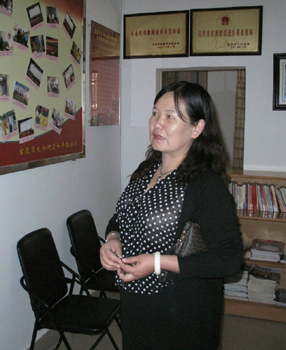A neighborhood committee worker
Duan Yongfen, a 45-year-old woman, has worked for 20 years for a neighborhood committee in Guandu District of Kunming, a city in southern China.
Neighborhood committee is a grass-roots part of China's local government. It is just like an extension of who live in the community. It mediates family disputes and takes responsibility for public security and the community's sanitary conditions.
 |
|
Duan Yongfen [Photo by Wu Jiachun]? |
Before she took the job, she had thought it was a great job which would allow her time to take care of her family, but she soon found what she did was small and unpleasant chores and didn't have regular working hours. She considered quitting the job and found another one which could allow her to spend more time on family.
But the following episode made her give up the idea of quitting: One day, her son was reported missing. Her colleagues, the local police and the residents all came to help looking for her child. She was so moved that she choose to stay.
In the 1990s, Duan and her colleagues helped the local people set up market stalls to run their own business, and she developed the community into a commodities market. As the local people became rich, the neighborhood committee got funds to improve their working conditions. But in the meantime, street pollution and chaos set in.
With the urban construction being standardized, the community market and makeshift buildings had to be dismantled in 2003. Duan Yongfen and her colleagues fought successfully to remove market stalls and provisional buildings in the community to make way for more livable conditions. It was a formidable job, because the shop owners felt sadness seeing their stalls dismantled. The committee used persuasion day-in and day-out to get them to move.
At the same time, Duan asked the local government to find a job for the people who lost their businesses. But not all the people understood her request. Some of them even accused her of stopping their business by disrupting utilities.
But when the community became better and cleaner, people who once accused her acknowledged they had blamed her wrongly and became apologetic.
Duan said she and her colleagues think of themselves as servants, rather than administrators.
"We put ourselves in others' shoes, because we are elected by the local residents. We are not officials, we are just servants," she said.
The neighborhood committee puts improvement of residents' lives as their top task. The committee's workers help unemployed residents to find jobs, take care of elderly people who have no family, fix blocked sewer lines, toil away at cleaning streets and renovate public toilets.
Through the efforts of the neighborhood committee, quite a few of low-income people have better jobs and the number of low-income families has been reduced to 180 from 220.
But Duan often said she was sorry for her family, because she was too busy to take care of her husband and son. She remembered when her son had a surgery, she was unable to accompany him to the hospital. When she got home late at night, her son had fallen asleep. She had to express her regrets and love in a letter which she left beside her son's pillow.
During the past twenty years, Duan's job is more of trivial than sublime, but her colleagues and residents speak highly of her.
"Duan and us cleaned 40 forlorn yards in the community and collected piles of rubbish which have been there for a century," recalled one of Duan's colleagues. "We were stung by flea during the cleaning."
"I have worked here for two years and sometimes really want to quit. However, when I see Mrs. Duan who has worked here for twenty years and has been paid a meager 2,000 yuan (US$308) a month, I think I have nothing to complain about," said the colleague.
(This article was translated by?He Shan.)
 0
0 






